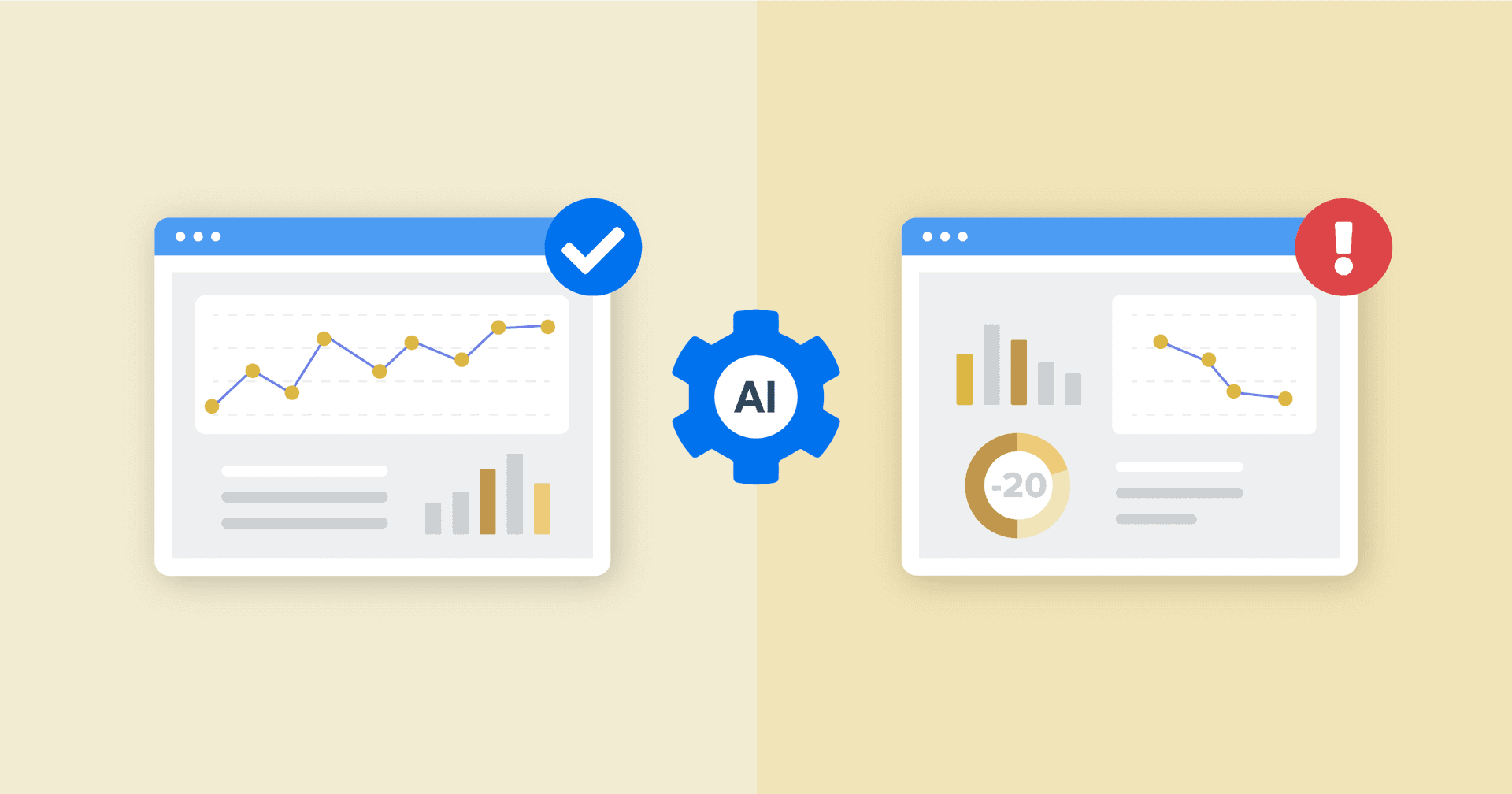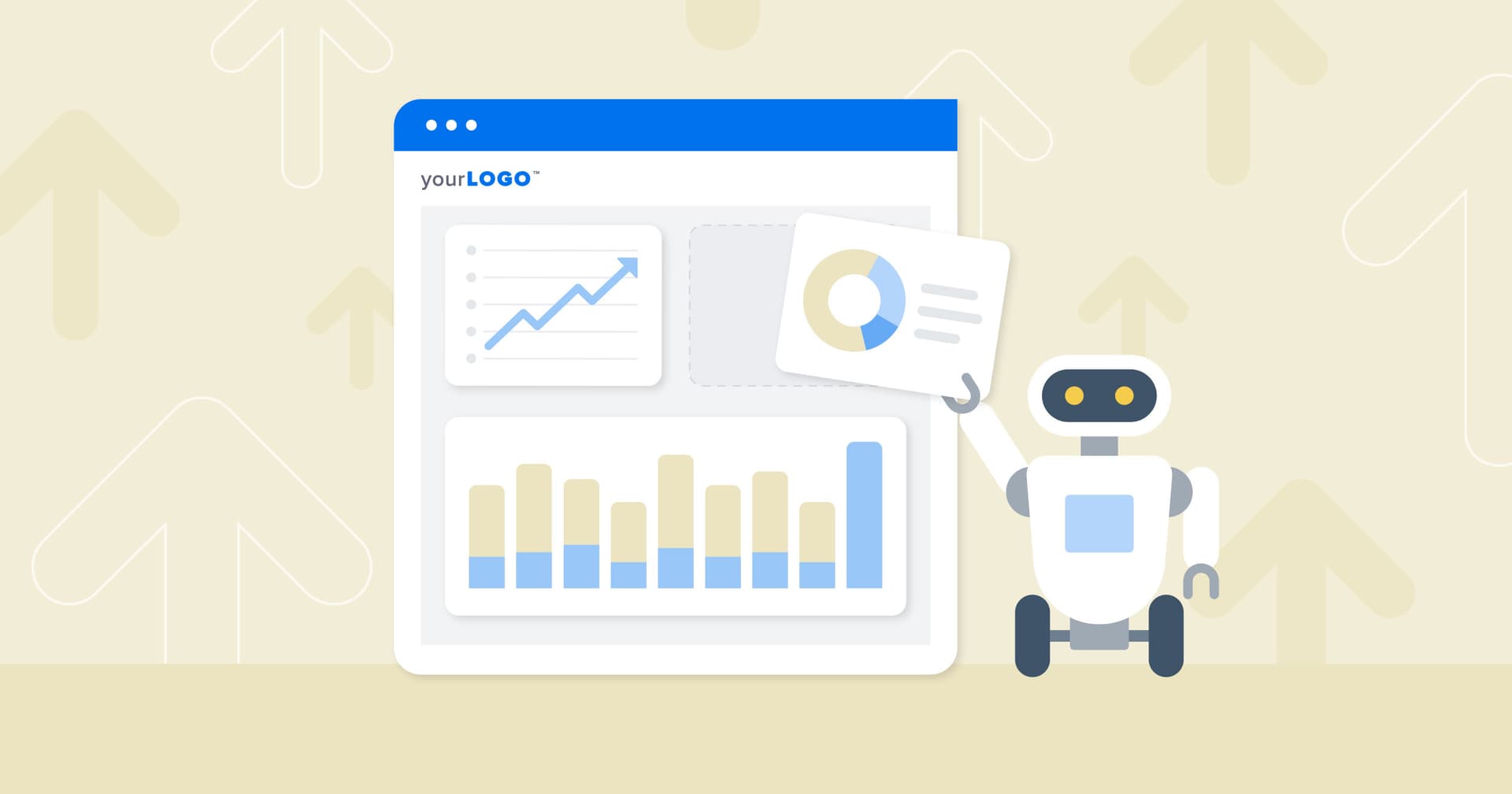Table of Contents
QUICK SUMMARY:
LLM tracking tools help agencies monitor AI search visibility, brand mentions, and rankings across ChatGPT, Google AI Overviews, Perplexity, and more. In this article, we’re sharing which rank trackers and AI SEO platforms are best for keeping clients visible in AI-driven search.
As AI continues to play a bigger role in our lives, SEO teams are feeling the pressure. Not only is it still important to track keyword rankings, but now it's essential to track how brands show up in AI search, AI overviews, and AI-generated search results.
Clients want clarity on their presence in front of AI bots and crawlers, and they expect agencies to translate that into measurable business value. The reality is, traditional rank trackers alone can’t do the job anymore. That’s why agencies are adding large language model (LLM) tracking tools to their stack—tools that combine AI monitoring, brand mentions, and search visibility across multiple AI engines.
Looking for AI SEO tools, but not sure where to start? Keep reading for everything you need to know about LLM tracking tools—and our top 10 picks for 2025.
What are LLM rank tracking tools?
LLM rank tracking tools are the next generation of rank trackers, built to measure visibility in both traditional search engines and AI search results. Beyond just showing where a site ranks in the SERP, search engine ranking reports track how brands appear in AI overviews, AI-generated search results, and other responses produced by large language models.
Some of these tools cover multiple types of rank tracking, from traditional SERP visibility to how your clients’ sites show up in different types of AI results. Others are add-ons to traditional SEO tools, providing LLM tracking to supplement your other keyword tracking tools. One thing is for sure: these tracking tools are evolving as quickly as SEO is, and they're also impacting how rank tracking is done.
The emergence of Generative AI in search is both exciting and transformative. It allows searchers to ask more nuanced and conversational questions, similar to having a dialogue with a real person. This shift towards natural language queries means SEO strategies will need to evolve, focusing more on understanding user intent rather than just specific keywords.
Stephan Moerman, Co-Founder, Bakklog
Why LLMs are changing rank tracking
AI rank tracking tools aren't a replacement for traditional rank tracking software, but a layer on top. Companies still need to track keyword rankings in major search engines, but they also need visibility into how major AI platforms and models interpret their brand. For teams evaluating scale, compare enterprise rank tracking tools that handle global datasets, multi-brand rollups, and AI-era SERP nuances.
This changes the scope of reporting for agencies. It’s no longer enough to track keywords in Google Search Console or with a standard rank tracker. Clients want to know if their brand is being cited and described accurately in AI overviews and recommended in AI search results. That means monitoring not just position, but presence and context.
This is a natural evolution as AI takes its place in digital marketing. From how agencies strategize, to how they execute, to how they track—AI is everywhere, and everyone's trying to figure out the best tools and processes to use it right.
The emergence of Generative AI in search is both exciting and transformative. It allows searchers to ask more nuanced and conversational questions, similar to having a dialogue with a real person. This shift towards natural language queries means SEO strategies will need to evolve, focusing more on understanding user intent rather than just specific keywords.
Stephan Moerman, Co-Founder, Bakklog
Impress clients and save hours with custom, automated reporting.
Join 7,000+ agencies that create reports in under 30 minutes per client using AgencyAnalytics. Get started for free. No credit card required.
Already have an account?
Log inNon-negotiable features to look for in an LLM tracking software
If you want to go beyond what traditional rank trackers are capable of, it's important to closely consider what exactly you're looking for. To help you out, we've outlined some of the essential features of LLM tracking tools, what they do, and why they matter:
Feature | What it does | Why it matters |
|---|---|---|
AI visibility tracking | Monitors when and where a brand appears in AI answers and overviews | Helps measure brand presence beyond traditional rankings |
Cross-platform monitoring | Tracks visibility across multiple AI engines (Google AI, Gemini, Perplexity, etc.) and traditional search | Provides a comprehensive view of search performance across channels |
Prompt and response capture | Logs the exact prompts and AI responses for tracked queries | Allows you to understand context and verify accuracy of mentions in LLMs |
Integration with SEO tools | Pulls in Google Search Console data and data from other keyword trackers and SEO tools | Combines AI tracking with existing reporting for a full performance picture |
Alerts for visibility changes | Sends notifications when a brand gains or loses visibility for a tracked query | Enables users to react quickly to shifts in AI search results |
Shows where competitors appear in AI responses and traditional rankings | Supports strategic planning and benchmarking | |
Historical tracking & trend analysis | Maintains records of AI ranking over time | Helps identify growth opportunities and report trends effectively |
Best LLM rank trackers compared
Choosing the right LLM tracking tool comes down to how well it fits your workflows, client needs, and reporting requirements. We've broken down the top tools on the market, highlighting their key features, strengths, and where they may fall short, to help you make an informed choice.
1. Semrush: Best for comprehensive AI visibility analytics
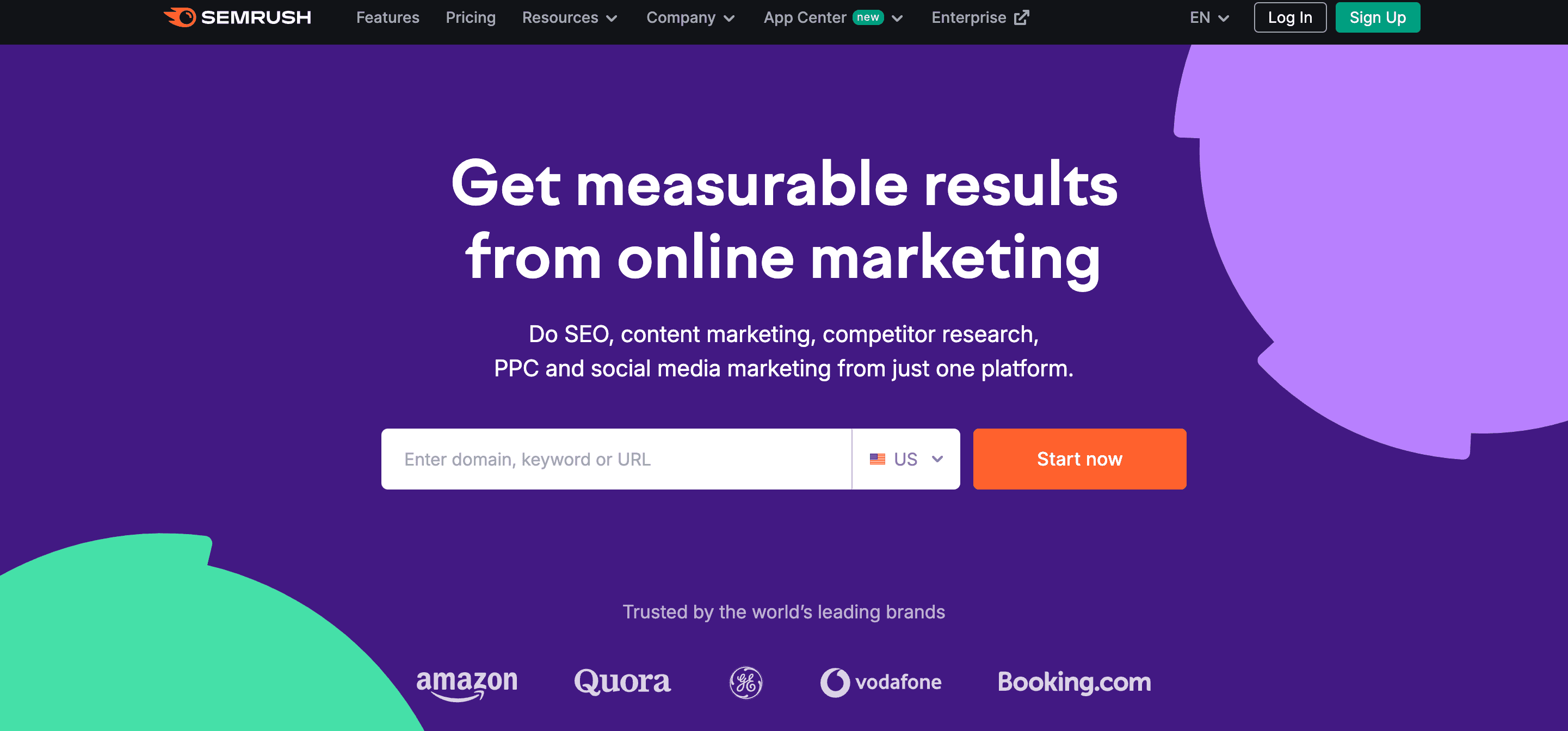
Semrush is a full-featured SEO platform designed to help you track and optimize performance across traditional and AI-driven search results. Its AI Visibility Index shows how a brand appears in AI-generated answers, overviews, and mentions across major platforms. For agencies managing multiple clients who need detailed reports on AI presence alongside traditional rankings, Semrush offers a strong feature set.
Semrush's top features
AI visibility index: Monitors a brand’s presence in AI-generated answers and summaries across major platforms.
AI SEO toolkit: Provides recommendations for aligning content with search queries and improving visibility in AI searches.
Cross-platform tracking: Combines AI results with traditional search engine rankings for a complete view.
Competitive analysis: Compares a brand's performance against competitors in AI and organic search.
Alerts & notifications: Notifies users when visibility changes, highlighting opportunities or risks.
Semrush pricing
Semrush starts at $139.95 per month for the Pro plan, with a free trial available to test the platform before committing.
2. Surfer: Best for AI rank tracking and content optimization
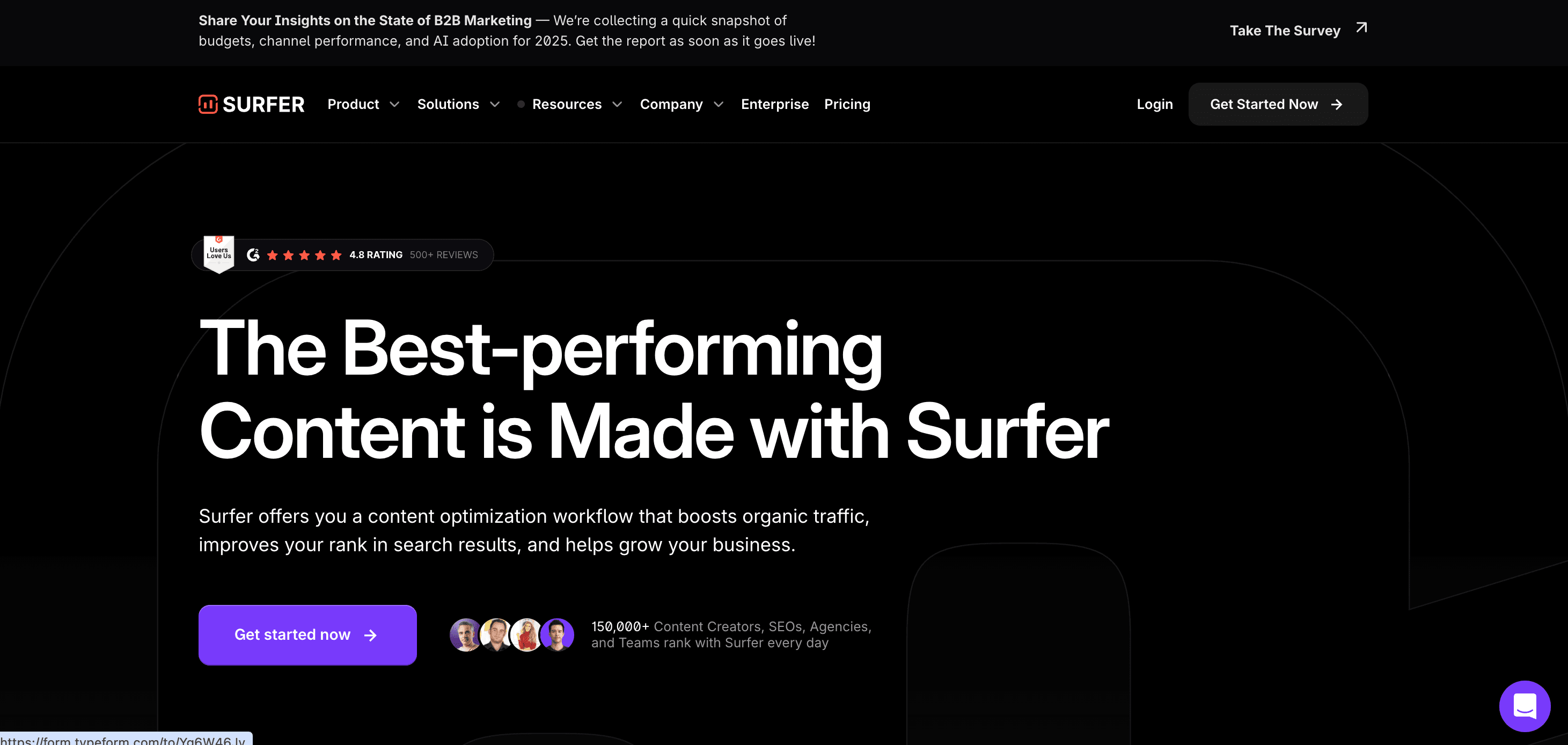
Surfer is an SEO and content optimization platform that helps users improve content performance and track AI search performance. Its AI Tracker is updated daily, and monitors mentions across top AI models like ChatGPT and Google AI Overviews. This helps you not just monitor your clients' AI rank performance, but also improve it in the same place using Surfer's content improvement tools.
Surfer's top features
AI tracker: Monitors brand mentions across ChatGPT and Google AI Overviews, providing daily updates for timely insights.
Prompt-level insights: Offers detailed data on specific prompts, helping you understand which queries generate AI responses for your clients.
Customizable tracking: Define specific prompts and track keywords for tailored monitoring.
Integration with Surfer tools: Seamlessly works with other Surfer features, enabling a holistic approach to SEO and content optimization.
Surfer pricing
Surfer's Essential plan is $99 per month, and its AI Tracker comes as a paid add-on starting at $95 per month for 25 prompts. Alternatively, the Scale plan is $175 per month and comes with the AI Tracker alongside other features.
3. Ahrefs Brand Radar: Best for tracking brand visibility with AI insights
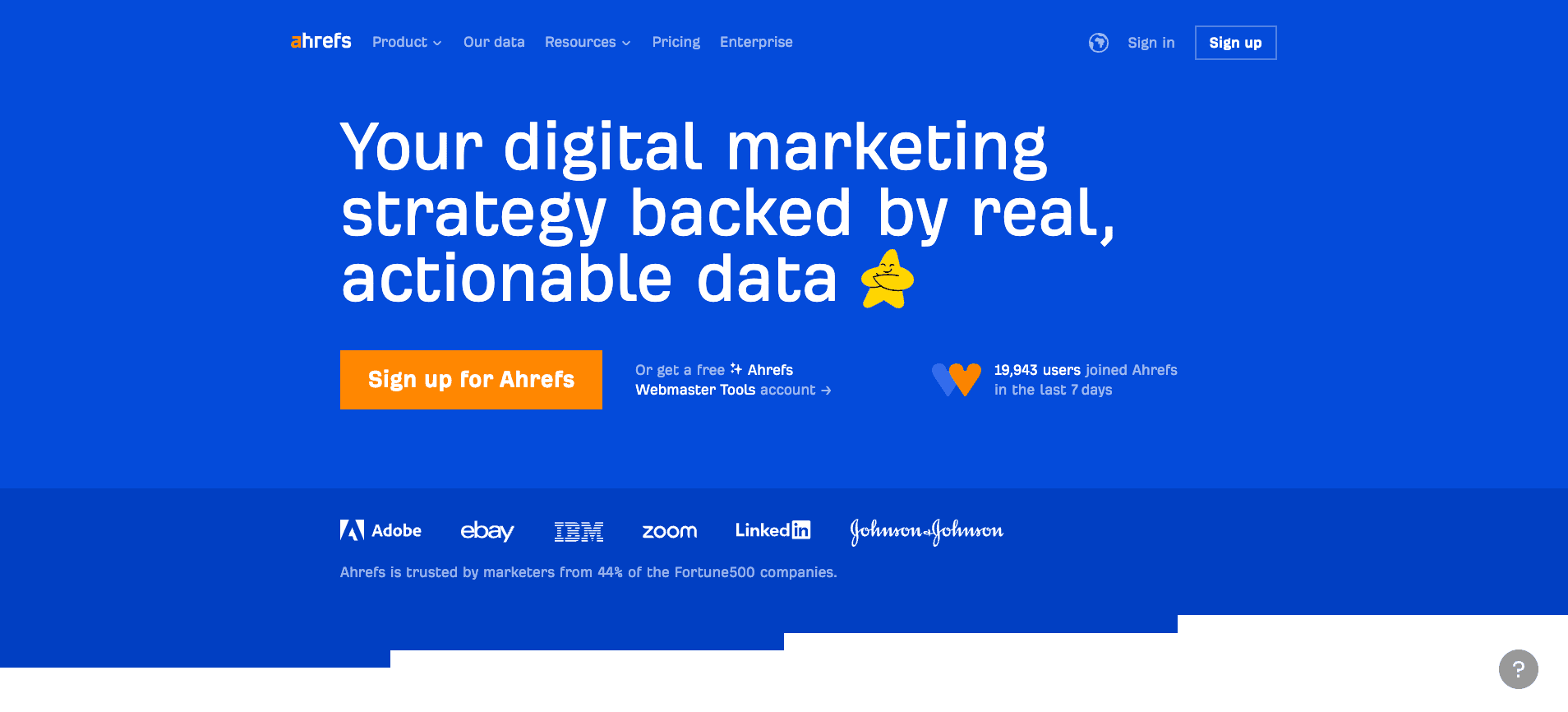
Ahrefs Brand Radar is a comprehensive SEO tool that monitors presence across AI search engines including Google AI Overviews, ChatGPT, Perplexity, and Microsoft Copilot. By integrating AI search data with traditional SEO metrics like backlinks and search demand, it provides a holistic view of your clients' online presence.
Ahrefs Brand Radar's top features
AI share of voice tracking: Monitors a brand's presence across AI platforms, tracking how often the brand is mentioned in AI-generated content.
Backlink integration: Correlates AI ranking with backlink data, allowing agencies to understand the impact of link-building efforts on AI mentions.
Web visibility monitoring: Detects brand mentions across websites and publications, including unlinked mentions, to provide a comprehensive view of online presence.
Custom prompt tracking: Allows you to define specific prompts and monitor how a brand appears in AI responses to those queries.
Ahrefs Brand Radar pricing
Ahrefs plans start at $129 per month, and its Webmaster Tools are available as a free plan, letting users try out the platform.
Clients are generally excited about the possibilities. They see the potential for Generative AI to revolutionize search by offering more personalized and conversational experiences. Many are eager to adapt, anticipating that this technology will enable them to better meet their customers' needs by providing more accurate and contextually relevant information.
Stephan Moerman, Co-Founder, Bakklog
4. LLMrefs: Best for AI-first brand monitoring
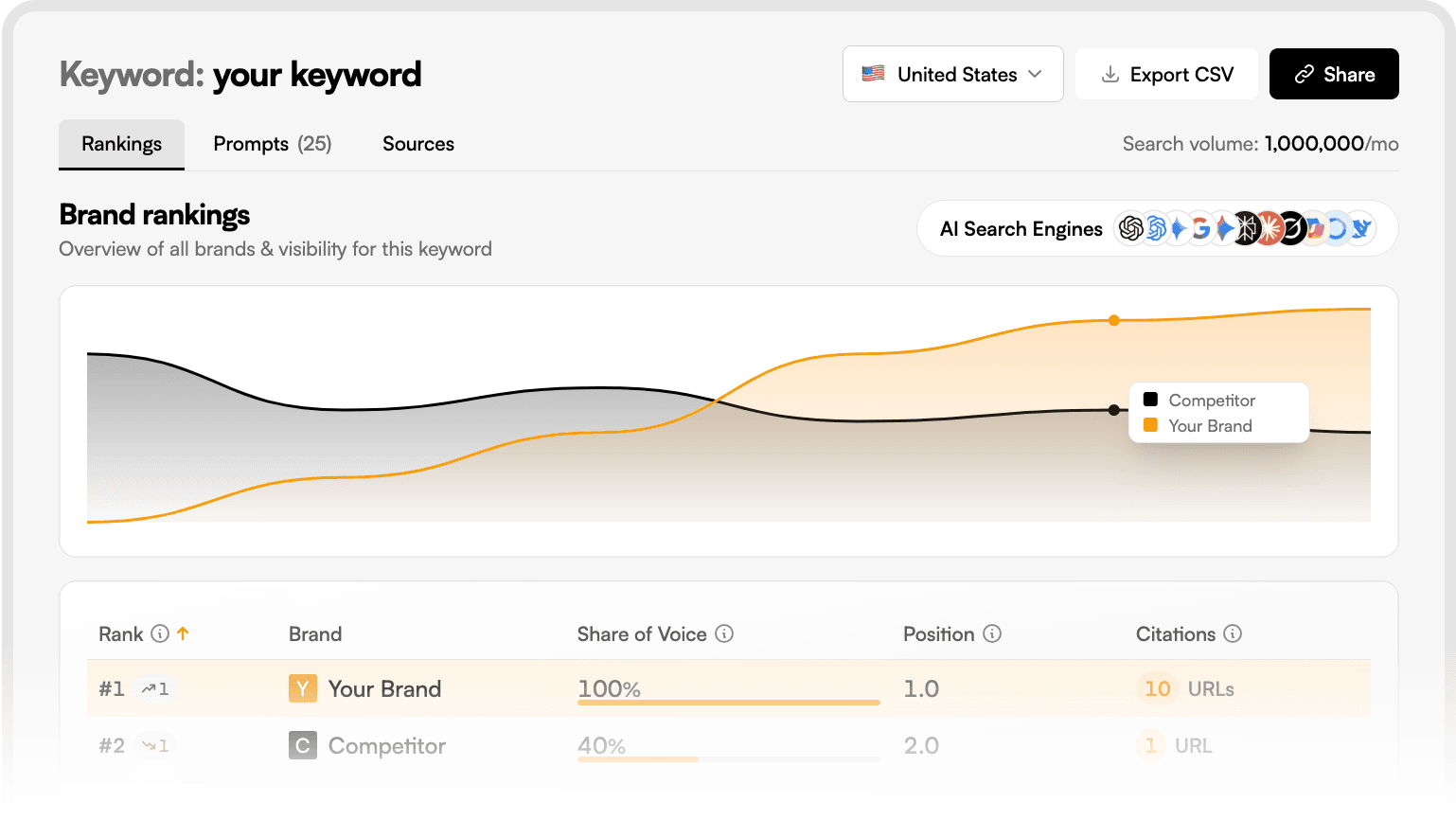
LLMrefs is an LLM-focused SEO platform that helps you track and enhance visibility across LLMs like ChatGPT, Perplexity, and Google Gemini. It offers real-time keyword tracking and a proprietary metric called the LLMrefs Score (LS), which quantifies how often and how prominently a brand appears in AI-generated responses.
LLMrefs's top features
LLMrefs Score (LS): A proprietary metric that measures a brand's visibility in AI search results, considering factors like ranking weight and consistency across different AI models and prompt variations.
Real-time keyword tracking: Monitors keyword rankings across major AI search engines, providing up-to-date insights into a brand's performance.
Weekly trend reports: Provides regular updates on AI visibility trends, helping identify growth areas or potential declines.
AI model bias analysis: Analyzes how different AI models interpret and rank content, revealing model-specific biases and preferences to inform optimization strategies.
LLMrefs pricing
LLMrefs offers a free plan with limited features, including tracking for one keyword and monthly reports. Paid plans start at $79 per month, and custom enterprise solutions are also available upon request.
5. Profound: Best AI insights for enterprise brands
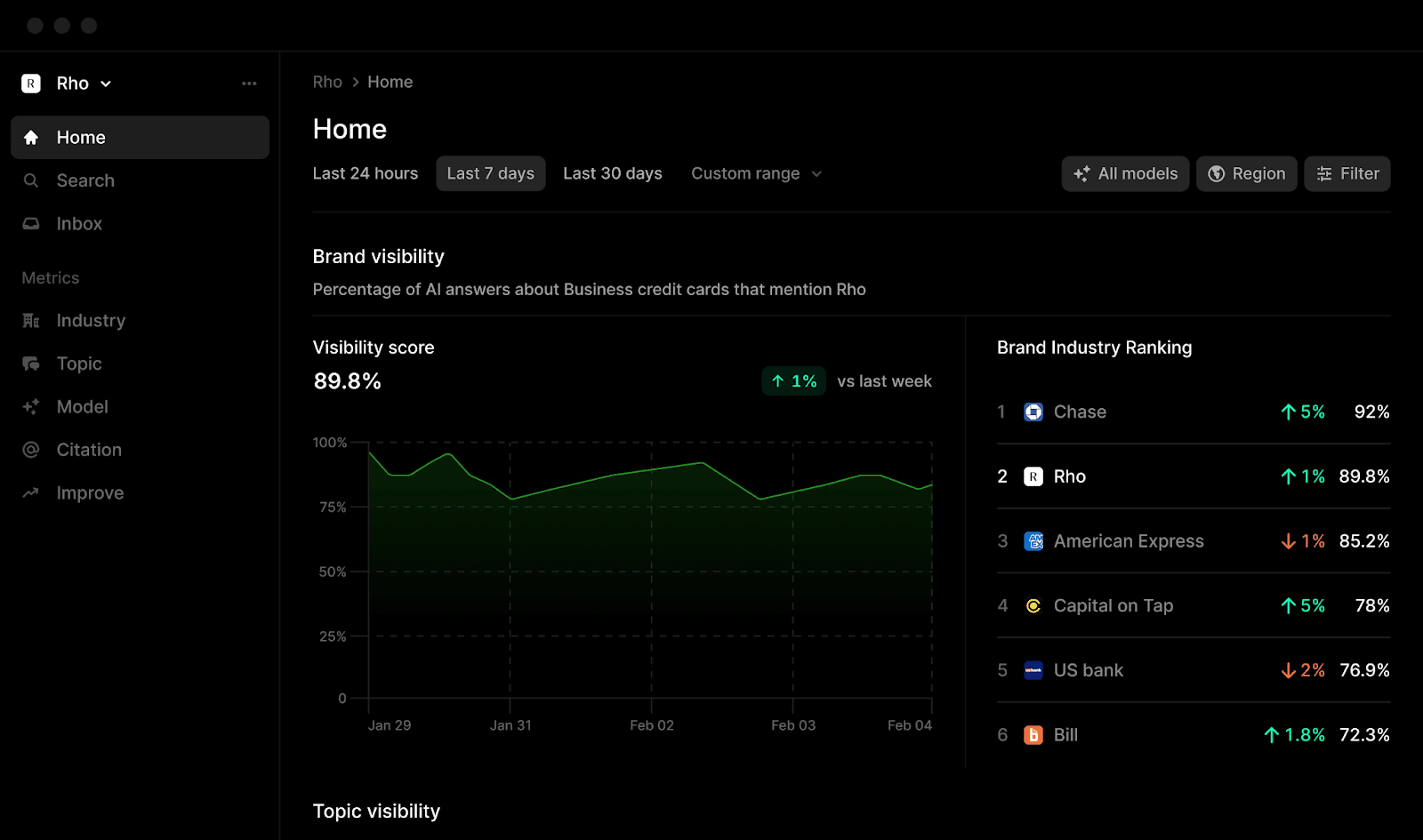
Profound is an AI visibility and optimization platform tailored for enterprises. It helps users not just track but also enhance their brand presence in search results from ChatGPT, Perplexity, and Google AI Overviews. It tracks AI visibility and provides actionable insights to inform content strategies, product positioning, and overall digital marketing efforts. If your agency works with enterprise clients, it could be worth looking into.
Profound's top features
Conversation explorer: Identifies trending topics and emerging conversations across AI platforms, helping you align content strategies with AI-driven user queries.
Answer engine insights: Analyzes AI responses to see how AI represents a brand, tracks its share of voice, and uncovers citations to identify the websites that drive AI answers.
Agent analytics: Monitors how AI crawlers behave, identifies which pages drive the most AI engagement, and measures how AI search translates into actual website traffic.
Strategic actions: Provides recommendations across earned media, social channels, and owned content based on high-performing patterns and citation trends.
Profound pricing
Profound offers a Lite plan for $499 per month, or customized pricing based on your business needs.
6. Peec AI: Best for regional AI sentiment tracking
Peec AI tracks AI search analytics, with tools to track rank position and visibility as well as sentiment analysis. It helps agencies understand how client brands are being represented on ChatGPT, Perplexity, and DeepSeek. The platform also offers reporting tools to easily communicate your findings to clients, or export data to use in a separate AI data analysis platform.
Peec AI's top features
Regional AI visibility tracking: Monitors brand mentions across multiple countries and languages, providing insights into regional performance.
Sentiment analysis: Assesses the tone and context of AI mentions to gauge public perception.
Prompt-level tracking: Allows users to monitor specific prompts and target keywords for targeted insights.
Customizable reporting: Provides exportable reports that can be tailored to meet client needs and preferences.
Peec AI pricing
Peec AI pricing starts at $119 per month, and a 14-day free trial is available.
7. Ziptie: Best with AI search prioritization
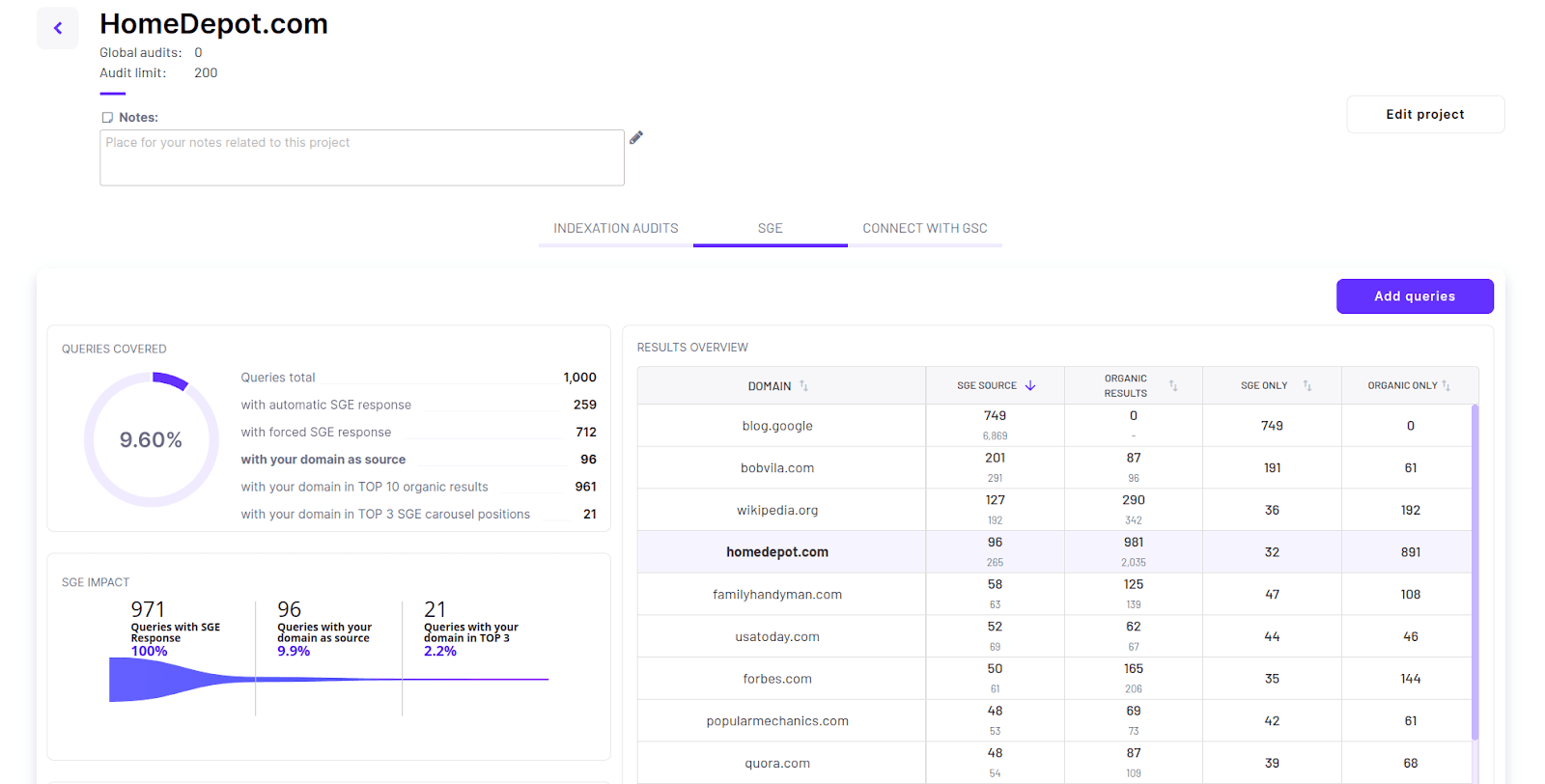
Ziptie lets you track and analyze visibility across AI-powered search engines like Google AI Overviews, ChatGPT, and Perplexity. What makes it stand out is its prioritization feature, which helps you understand which SEO opportunities you should tackle first. For busy agencies juggling multiple clients, this is a great way to make sure you're not missing out on any quick wins.
Ziptie's top features
AI search monitoring: Tracks brand visibility across Google AI Overviews, ChatGPT, and Perplexity, providing insights into AI-generated responses.
Detailed query analysis: Offers exact text and downloadable screenshots of AI responses, allowing for in-depth examination of brand mentions.
Competitor comparison: Identifies which competitors are appearing in AI responses, aiding in competitive analysis and strategy development.
User-friendly interface: This platform is particularly easy to navigate, making it quick to get up and running.
Ziptie pricing
Ziptie starts at $69 per month, and a 14-day free trial is available.
8. SE Ranking: Best with agency-specific features
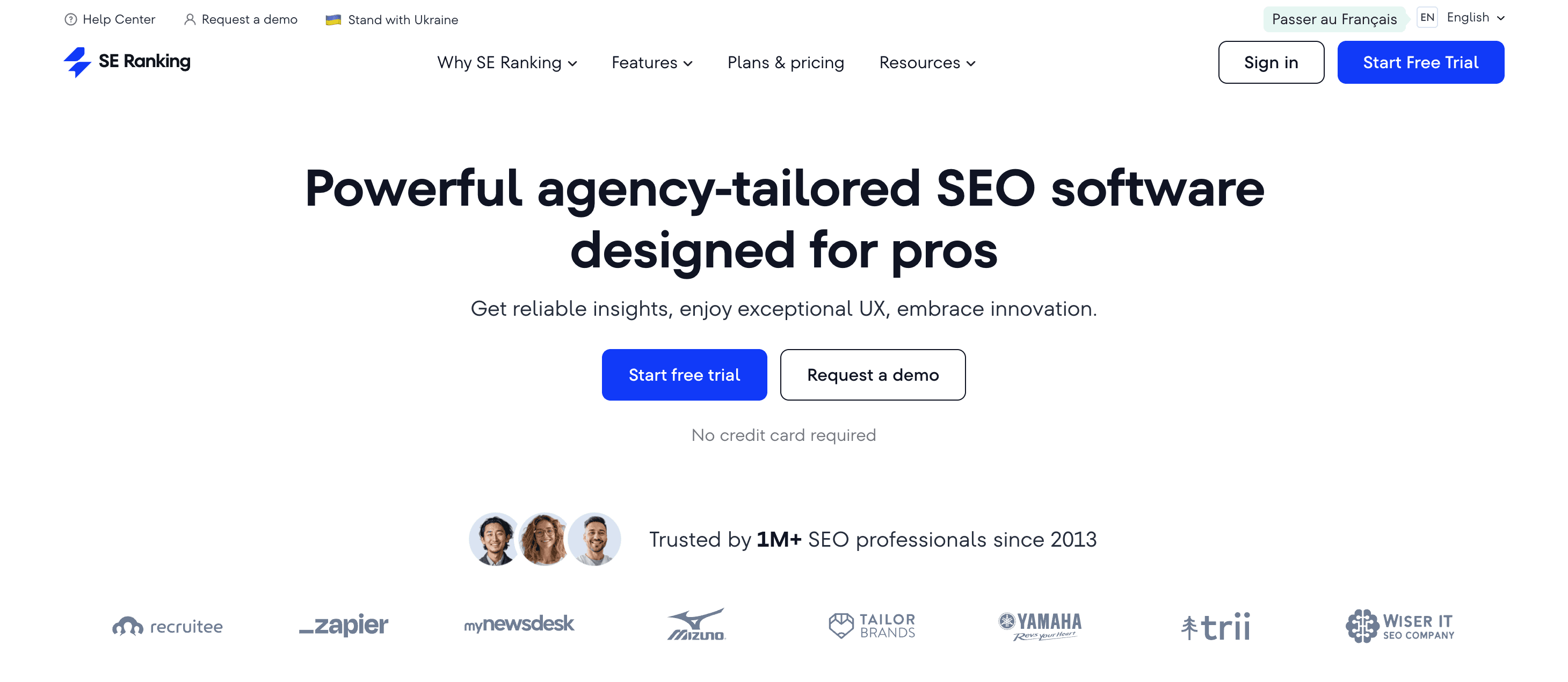
SE Ranking is a comprehensive SEO platform, with features for on-page SEO, site auditing, backlink checks, and rank tracking (including AI rank tracking). It's positioned for both in-house marketing teams and agencies, and has some features designed specifically for agencies. These include the ability to manage client projects and share guest links.
SE Ranking's top features
AI results tracker: Monitors brand mentions and links in AI-generated answers, providing insights into AI visibility.
Keyword tracking: Tracks keyword rankings in traditional and AI search results, offering a comprehensive view of SEO performance.
Competitor analysis: Compares brand visibility in AI Overviews with competitors, helping identify areas for improvement.
Regional coverage: Offers localized marketing tools, including a local rank tracking tool for Google Maps profiles.
SE Ranking pricing
SE Ranking plans start at $65 per month, and a 14-day free trial is available. With the addition of API access, SE Ranking keyword performance reports integrate seamlessly into the AgencyAnalytics reporting platform.
9. Otterly: Best for affordable multi-platform tracking
Otterly is a rank tracking tool that covers multiple AI search engines and LLMs, including ChatGPT, Perplexity, Google Gemini, Microsoft Copilot, and Google AI overviews. If you want a multi-platform AI rank tracking tool, this might be a good one to check out. It also lets you monitor specific search prompts and offers keyword suggestions based on your existing keywords, brand name and URL.
Otterly's top features
AI search monitoring: Automatically tracks brand mentions and link citations across multiple AI search platforms, providing real-time insights into AI visibility.
Brand monitoring: Generates dedicated dashboards to monitor key performance indicators such as brand mentions, coverage, and domain citations.
Brand visibility index: Offers a percentage-based visibility scoring system to benchmark brand presence across AI search engines.
Sentiment analysis: Assesses the tone of AI-generated content mentioning the brand, categorizing mentions as positive, neutral, or negative.
Otterly pricing
Otterly's pricing starts at $29, making it the most affordable option on this list. A 14-day free trial is also available.
10. Rankability: Best for Answer Engine Optimization (AEO)
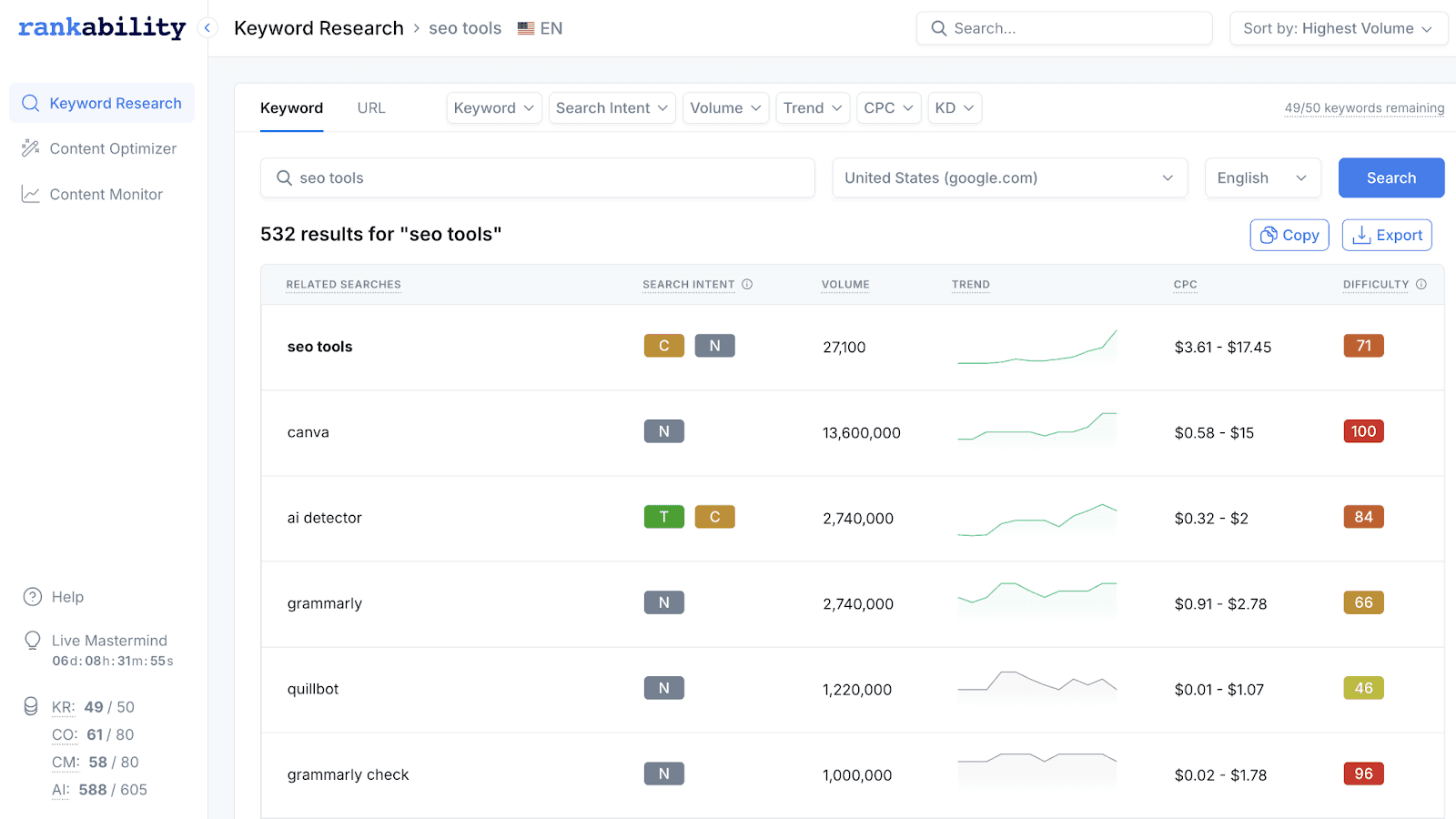
Rankability is an AI search intelligence and optimization platform designed to help users monitor and enhance their brand visibility across AI search engines. It offers a unified dashboard that allows agencies to track branded and commercial prompts, identify which pages get cited, and implement practical workflows to close visibility gaps.
Rankability's top features
AI search visibility benchmarking: Track brand presence across multiple AI platforms, including ChatGPT, Gemini, Claude, Perplexity, DeepSeek, and Copilot.
AI citation audits: Identify content gaps and receive actionable recommendations to increase AI citations.
Traffic attribution: Connect AI search visibility to real business outcomes, such as website traffic, leads, and sales.
LLM reasoning analysis: Understand how large language models perceive your brand and adjust strategies accordingly.
Rankability pricing
Rankability plans start at $149 per month, and a free trial is available.
Best AI SEO Tools: Summary
Here's a high-level overview of the LLM tracking tools listed, for quick reference:
Tool name | Best for | Cons | Pricing |
|---|---|---|---|
Semrush | Best for comprehensive AI visibility analytics | AI Visibility Index data is limited to certain regions and updates weekly, not in real time. | From $139.95/month, free trial available |
Surfer | Best for AI rank tracking and content optimization | AI Tracker requires paid add-on; tracking many prompts drives cost up quickly. | From $99/month (+ AI Tracker from $95), free trial available |
Ahrefs Brand Radar | Best for tracking brand visibility with AI insights | AI content tracking is still early and captures only some AI responses; UI not the most intuitive for non-SEO specialists. | From $129/month, free features under Ahrefs Webmaster Tools |
LLMrefs | Best for AI-first brand monitoring | Limited historical data and fewer integrations compared to other platforms. | From $79/month, free plan available |
Profound | Best for integrating AI insights into digital marketing strategies | Plans are expensive and aimed at enterprise, which may overdeliver for smaller agencies. | From $499/month, free trial available |
Peec AI | Best for regional AI sentiment tracking | Limited prompt quota in lower tiers; less mature competitor benchmarking in some regions. | From $119/month, 14-day free trial available |
Ziptie | Best with AI search prioritization | Smaller feature set outside of AI overview tracking; may lack deeper SEO metrics. | From $69/month, 14-day free trial available |
SE Ranking | Best for agency-specific features | AI overview and rank tracking features offer less coverage compared to tools built primarily for AI monitoring. | From $65/month, 14-day free trial available |
Otterly | Best for affordable multi-platform tracking | Coverage depth and scale is limited on lowest-cost plans; may not be suitable for large agency settings. | From $29/month, 14-day free trial available |
Rankability | Best for Answer Engine Optimization (AEO) | Newer tool, users report some gaps in prompt coverage and LLM platform breadth when compared with leaders. | From $149/month, free trial available |
Adapting to Generative AI in search presents several challenges for agencies, including the need to overhaul traditional SEO strategies to focus more on user intent and natural language processing. There is also the challenge of producing higher-quality, in-depth content that meets the sophisticated demands of AI-generated queries.
Agencies must also invest in continuous learning and training to keep up with rapidly evolving AI technologies, which can be resource-intensive. Ensuring data privacy and addressing potential biases in AI algorithms further complicates the adaptation process.
Despite these challenges, agencies that can navigate this transition will be well-positioned to leverage the full potential of AI in enhancing search experiences.
Stephan Moerman, Co-Founder, Bakklog
How to choose the right LLM rank tracker
To pick the right LLM rank tracker for your agency, you need to think through which features will truly add value for your client reporting. Plus, you'll want to consider how it connects with the rest of your tech stack and how user-friendly it is. Here are some key factors to consider when you're evaluating these tools:
AI search visibility: Look for a rank tracker that shows how your brand appears in AI generated search results, AI Overviews, and AI generated responses. This is critical for proving search visibility in a world that's becoming more and more reliant on AI engines.
Integration with AI platforms: The best LLM tracking tools connect with multiple AI platforms and AI bots, helping SEO teams compare visibility across different AI sources.
Tracking rankings and keywords: A strong tool should let you track keywords, search queries, and brand mentions over time.
Brand monitoring and sentiment analysis: Beyond tracking rankings, some platforms also surface brand mentions and offer sentiment analysis to gauge AI presence and reputation across AI generated responses.
Ease of use: Some rank trackers come with a steep learning curve. Look for platforms that are straightforward to set up and run, especially if you’re going to be sharing dashboards with clients.
Generative engine optimization: Choose AI monitoring tools that not only report on visibility but also surface actionable data for generative engine optimization strategies. This helps you connect LLM tracking insights directly to SEO performance.
Pricing and free plan options: Not every agency needs enterprise-level AI monitoring. If you’re testing tools or working with smaller clients, consider trying a free plan or free trial before you commit.
Final thoughts
AI-driven search is changing faster than most teams can keep up with. From AI overviews in Google to generative responses across platforms like ChatGPT and Gemini, the way brands appear in front of users is evolving by the day.
The LLM tracking tools in this guide are built to help agencies keep pace—whether that means tracking rankings, monitoring brand mentions, or uncovering insights for generative engine optimization. While no tool is perfect, each offers its own way to help you understand how AI crawlers and AI bots are shaping search visibility.
For agencies willing to adapt, these rank trackers aren’t just reporting add-ons—they’re a window into the future of search.

Written by
Kyra Evans is the Manager of Content Marketing at AgencyAnalytics. She has over 15 years of experience writing content for SaaS, tech, and finance brands. Her work has been featured by HuffPost and CBC, and she serves an engaged social media readership of over 30,000 community members.
Read more posts by Kyra EvansSee how 7,000+ marketing agencies help clients win
Free 14-day trial. No credit card required.



